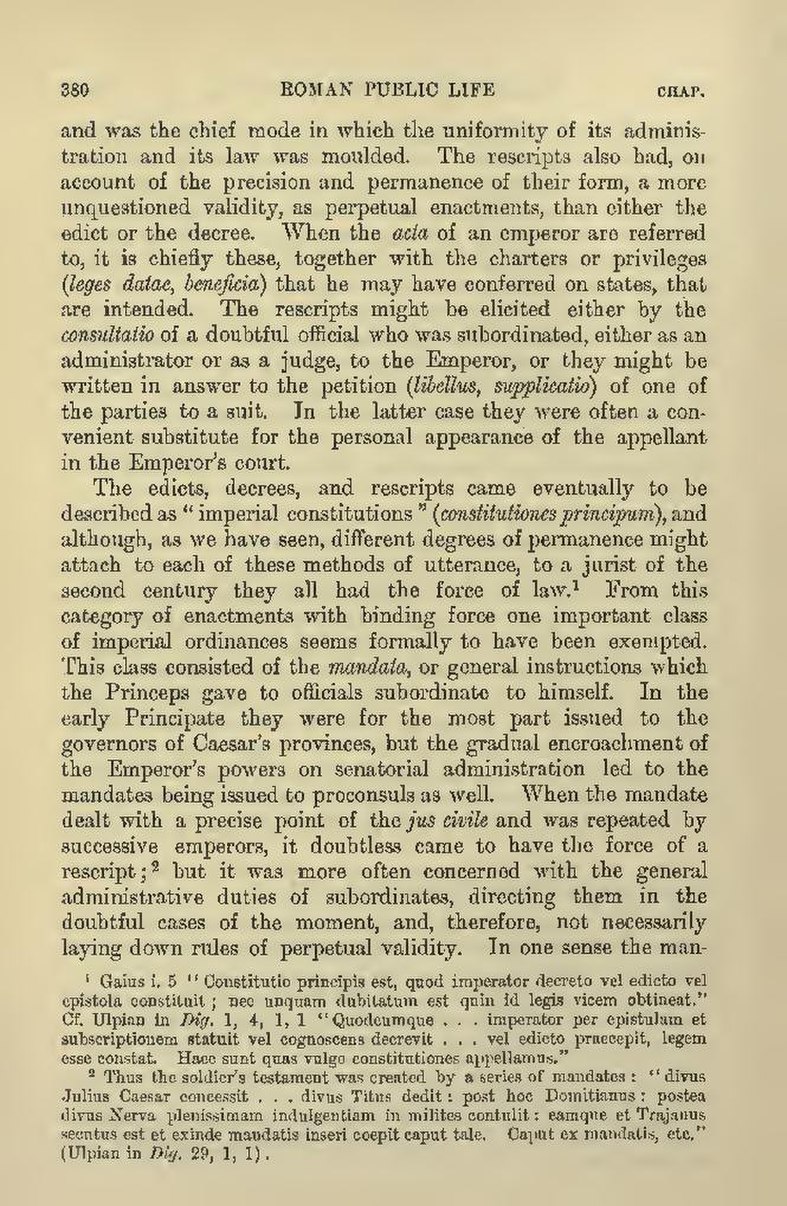and was the chief mode in which the uniformity of its administration and its law was moulded. The rescripts also had, on account of the precision and permanence of their form, a more unquestioned validity, as perpetual enactments, than either the edict or the decree. When the acta of an emperor are referred to, it is chiefly these, together with the charters or privileges (leges datae, beneficia) that he may have conferred on states, that are intended. The rescripts might be elicited either by the consultatio of a doubtful official who was subordinated, either as an administrator or as a judge, to the Emperor, or they might be written in answer to the petition (libellus, supplicatio) of one of the parties to a suit. In the latter case they were often a convenient substitute for the personal appearance of the appellant in the Emperor's court.
The edicts, decrees, and rescripts came eventually to be described as "imperial constitutions" (constitutiones principum), and although, as we have seen, different degrees of permanence might attach to each of these methods of utterance, to a jurist of the second century they all had the force of law.[1] From this category of enactments with binding force one important class of imperial ordinances seems formally to have been exempted. This class consisted of the mandata, or general instructions which the Princeps gave to officials subordinate to himself. In the early Principate they were for the most part issued to the governors of Caesar's provinces, but the gradual encroachment of the Emperor's powers on senatorial administration led to the mandates being issued to proconsuls as well. When the mandate dealt with a precise point of the jus civile and was repeated by successive emperors, it doubtless came to have the force of a rescript;[2] but it was more often concerned with the general administrative duties of subordinates, directing them in the doubtful cases of the moment, and, therefore, not necessarily laying down rules of perpetual validity. In one sense the man-*
- ↑ Gaius i. 5 "Constitutio principis est, quod imperator decreto vel edicto vel epistola constituit; nec unquam dubitatum est quin id legis vicem obtineat." Cf. Ulpian in Dig. 1, 4, 1, 1 "Quodcumque . . . imperator per epistulam et subscriptionem statuit vel cognoscens decrevit . . . vel edicto praecepit, legem esse constat. Haec sunt quas vulgo constitutiones appellamus."
- ↑ Thus the soldier's testament was created by a series of mandates: "divus Julius Caesar concessit . . . divus Titus dedit: post hoc Domitianus: postea divus Nerva plenissimam indulgentiam in milites contulit: eamque et Trajanus secutus est et exinde mandatis inseri coepit caput tale. Caput ex mandatis, etc." (Ulpian in Dig. 29, 1, 1).
